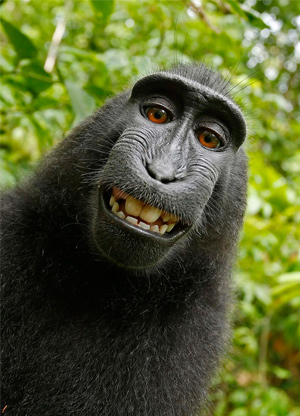David Slater, a British nature photographer has been documenting wildlife since 2008. While travelling to Indonesia, he took photographs of endangered animals, and licensed some of them to the Caters News Agency who then released them.
It was on 4th of July 2011 that several media took notice of an article with the description on a self-portraits taken by Celebes crested macaque. "Monkey steals camera to snap himself," said the publication, "a camera on a tripod" triggered by the monkeys because they were "fascinated by her reflection in the lens".
The articles also contained some words from Slater, saying that "He must have taken hundreds of pictures by the time I got my camera back."
This started a case called "the monkey selfie copyright" dispute.

The disputes started when Wikimedia Commons and Techdirt hosted the images on their website after their publication, over Slater's objections, and also from People for the Ethical Treatment of Animals (PETA), who have argued that the macaque should be assigned the copyright.
The Wikimedia Foundation's refusal to remove the pictures from its image library was because of an understanding that the copyright is held by the creator, and that a non-human creator (including animals) cannot hold copyright. And also because the images were previously hosted on the public internet.
Slater said that he had lost about "£10,000 or more in income" because of this by August 2014.
It was in December 2014 that the U.S. Copyright Office stated that works created by a non-human, such as the case of Slater's photograph taken by a monkey, are not copyrightable. A number of legal experts have also argued that Slater's role as the camera owner led to the picture being taken, may have been sufficient to establish a valid copyright.
PETA disputed that monkey selfies can be declared copyrighted materials. And for that, PETA then filed a lawsuit against Slater, requesting the the monkey in question be assigned a copyright, and whatever gained from the photo should be donated to the future of wildlife and the species' benefit.
This was again disputed in 2016 by a judge that ruled that the monkey cannot own the copyright to the images. PETA appealed, and in September 2017, both PETA and the photographer agreed to in a settlement that Slater would donate a portion of future revenues on the monkey photographs to wildlife organizations.
In April 2018, or after almost 7 years, the court finally ruled that animals can not legally hold copyrights.